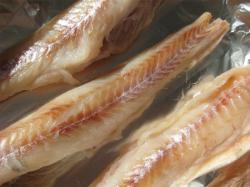Russia’s Biggest MSC Certified Fishery Reconfirms Sustainability
September 10, 2018 | 4 min to read

In a milestone development, the Russian Pollock Catchers Association's Sea of Okhotsk Pollock fishery has received Marine Stewardship Council (MSC) certification for a second time. Once again confirmed as sustainable and well-managed, the fishery's catch can carry the blue MSC label.
The fishery is one of the world’s largest suppliers of Pollock from the North Pacific, serving over 20 countries across five continents. Every five years MSC certified fisheries have to go through the full assessment process again to ensure they are continuing to meet the MSC Fisheries Standard. The assessment was carried out by third-party conformity assessment body Acoura Marine.
Continuous improvement
The Pollock Catchers Association (PCA) first obtained MSC certification in 2013. The fishery was given 8 conditions – improvement areas to address during the five-year certificate period – and all of these were closed. Three conditions were aimed at improving the scientific basis of stock assessment and fishery management and were met successfully. Another three conditions concentrated on minimizing the fishery's impact on the Sea of Okhotsk ecosystem, including fishing operations' interaction with Endangered, Threatened and Protected (ETP) species. Two further conditions were set for the management process. Closure of these conditions has led to greater transparency and closer involvement of stakeholders, including environmental NGOs.
Camiel Derichs, Director MSC Europe said: “Congratulations to the Pollock Catchers Association (PCA) on their recertification. Over the past five years, the PCA, scientists, management and NGO actors in Russia have worked hard to address the conditions placed on the fishery, resulting in real improvements. The progress achieved was recognised in the re-assessment, where the PCA received higher scores than previously for many assessment indicators.”
“As the only global wild capture fisheries standard meeting the ISEAL codes of good practice, the MSC reviews its standards every five years in light of progressing science and management best practice. As a result of the last Fisheries Standard Review (FSR), the MSC has adopted a new standard (version 2.0). Over the course of their new certification time frame, we hope the PCA will continue to make improvements to ensure a smooth transition to this new version of the MSC Standard,” he continued.
Support from WWF-Russia
"WWF Russia started cooperation with the Pollock Catchers Association before their first certification was issued. WWF was one of the organisations that raised objections to this fishery.
At present, we are satisfied with the progress observed during the five-year period since the first certificate was issued. The Association has already taken into account a number of comments made by WWF during annual audits. To study and minimize the bycatch of seabirds and marine mammals, – PCA management together with scientists from the TINRO-center conducted works on vessels.
Significant work has been done on observer involvement on PCA vessels. The number of observers from fisheries research institutes increased to 23 specialists in 2018.
Also, over the past 2 years PCA’s website became more informative. This is also the result of the WWF comments raised to PCA.
At present, WWF-Russia and PCA consider the implementation of some new projects, including the reduction of bycatch of mollusks. I hope that for the coming years WWF-Russia and the PCA will continue partnering to improve the sustainability of the Russian Pollock fishery" said Andrey Vinnikov, Director Sustainable marine fishery Programme WWF Russia.
The Russian Pollock Catchers Association
“After initial certification, PCA developed and implemented a large-scale action plan for certification conditions. With the support of fishery research institutes, we were able to obtain much deeper understanding of the impacts the fishery may have on the ecosystem. The PCA also funded research on modelling of the trophic network of the Sea of Okhotsk ecosystem, and an at-sea survey of sea birds and mammals interaction with gear. The PCA supported the initiative of the Observer Working Group to increase a number of scientific observers from fishery research institutes. As a result, monitoring scope and coverage doubled since 2014, and the amount of biological data collected from the fishery is four times higher than before. In the 2018 season, 20% of the PCA vessels carried scientific observers. All the above resulted in a smooth re-certification process, and the good scores the fishery has been awarded” said German Zverev, President of the Russian Pollock Catchers Association (PCA)
In 2018 the PCA includes 30 Pollock fishing companies. In 2017, the total amount of landings for this fishery was 715 000 00 metric tons. The vessels process catch on board, making frozen whole and gutted product. Some vessels produce fillets.
This fishery uses mid-water trawls, which are more selective and usually less destructive than bottom trawls, as they aren't in constant contact with the sea floor.
Source: Marine Stewardship Council
